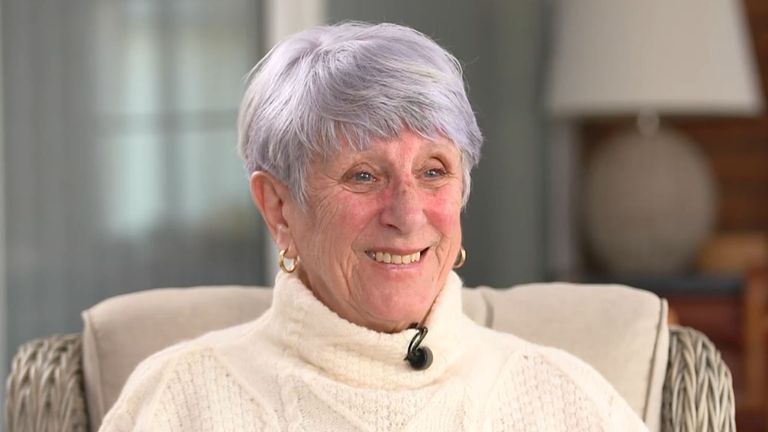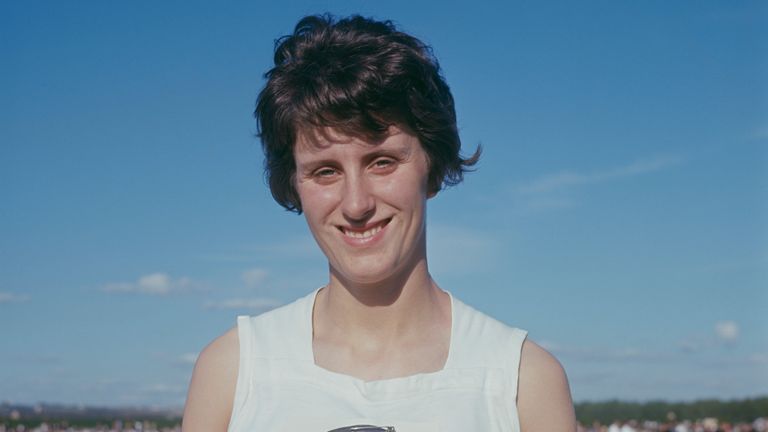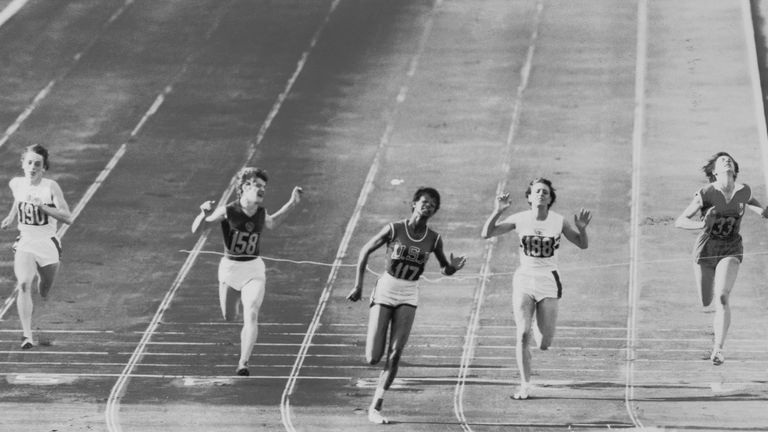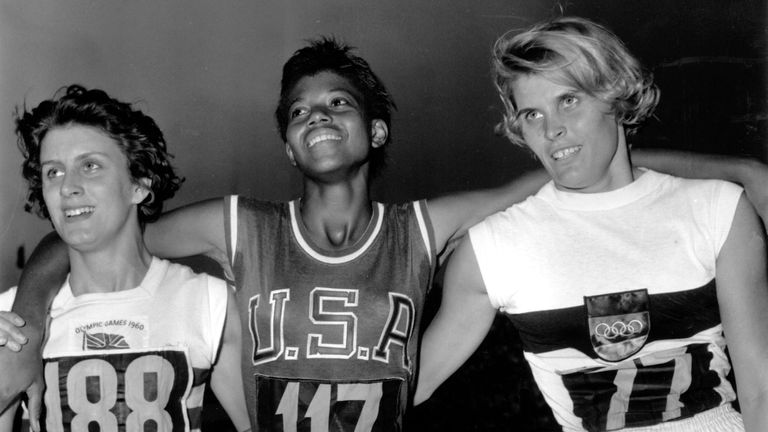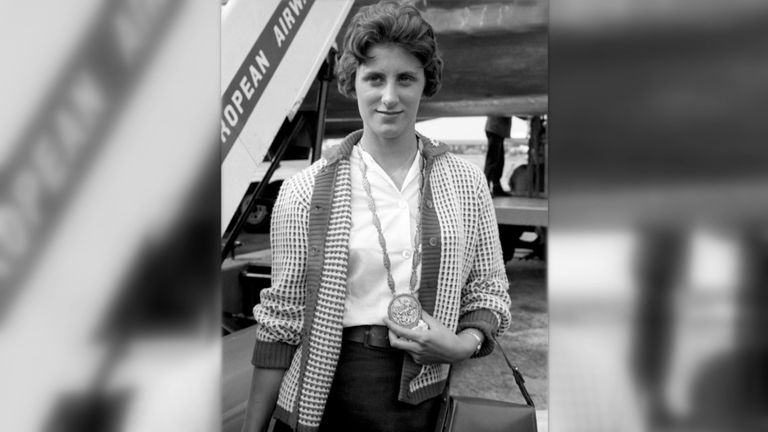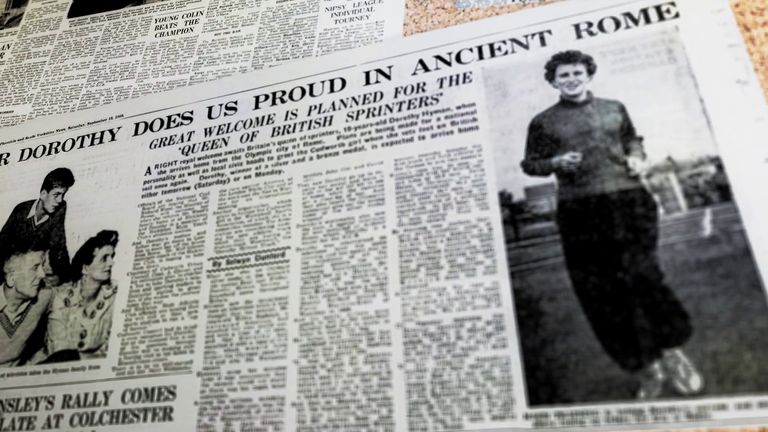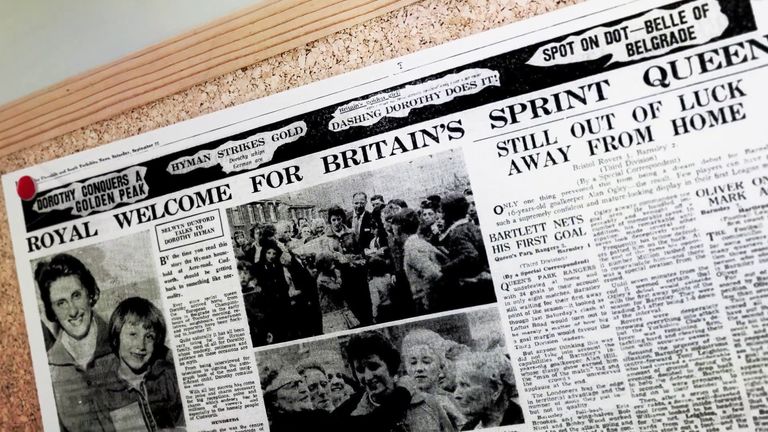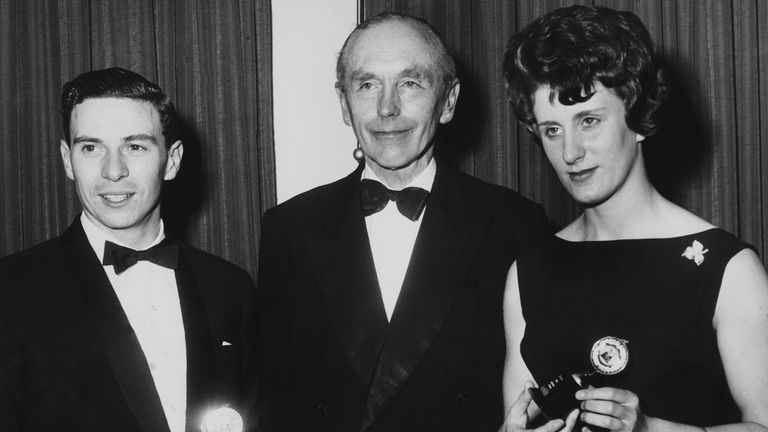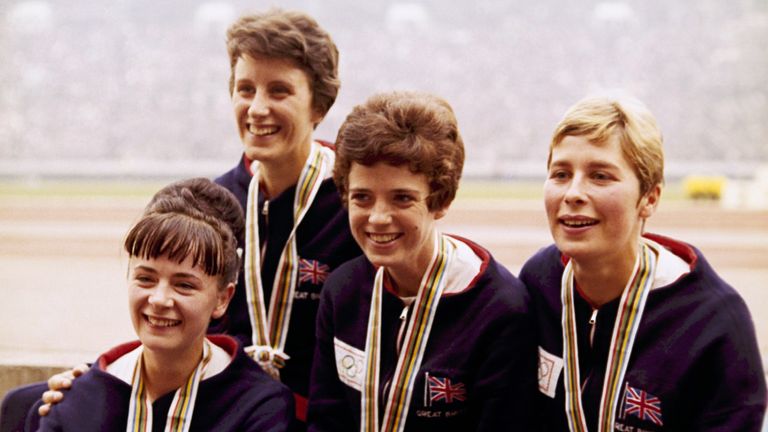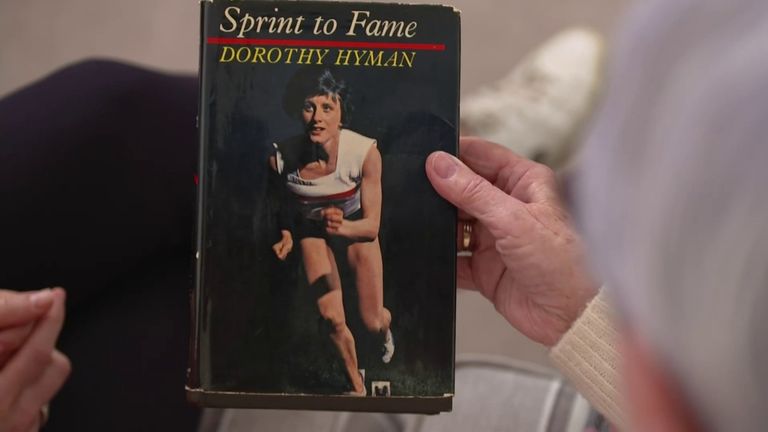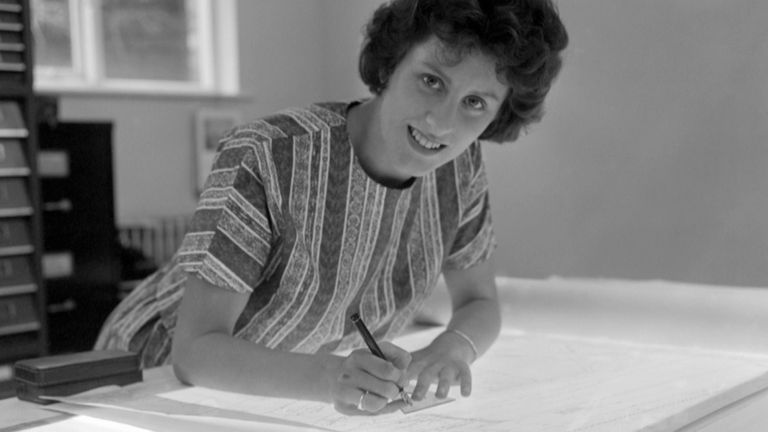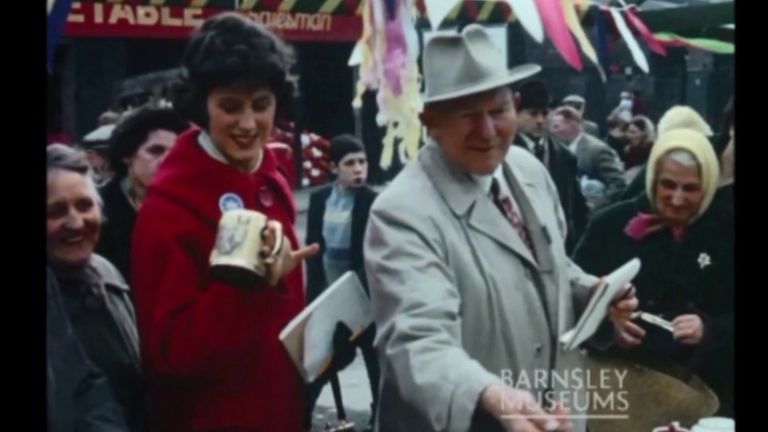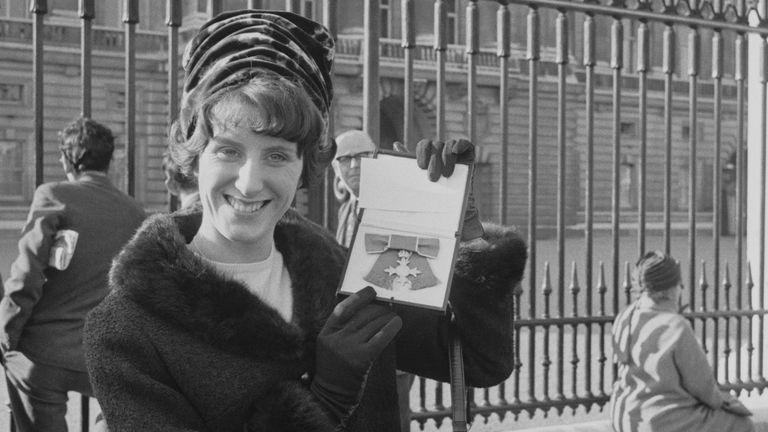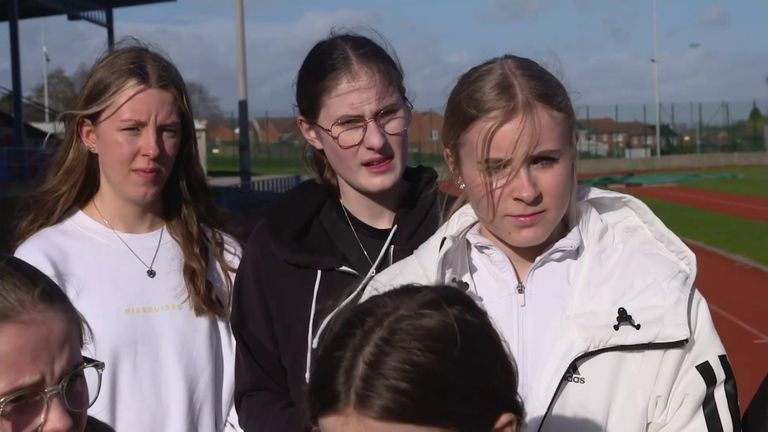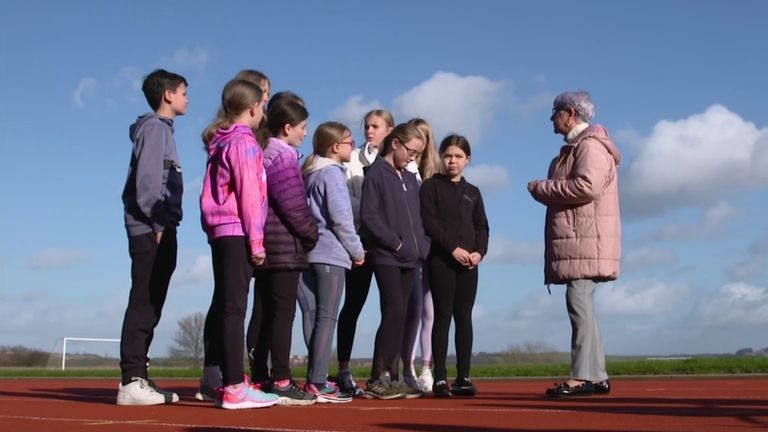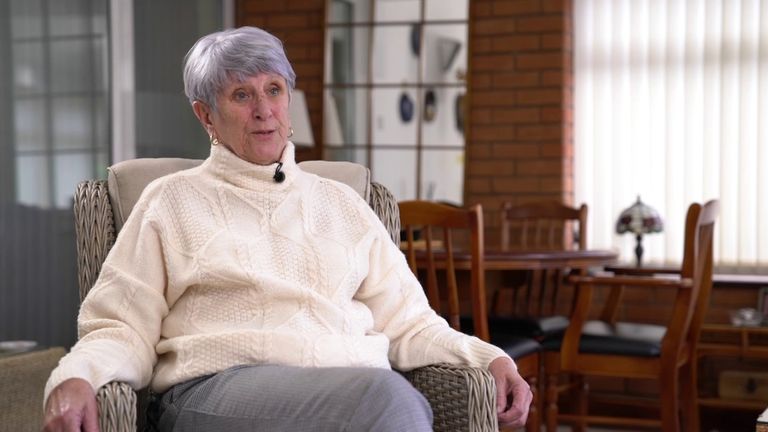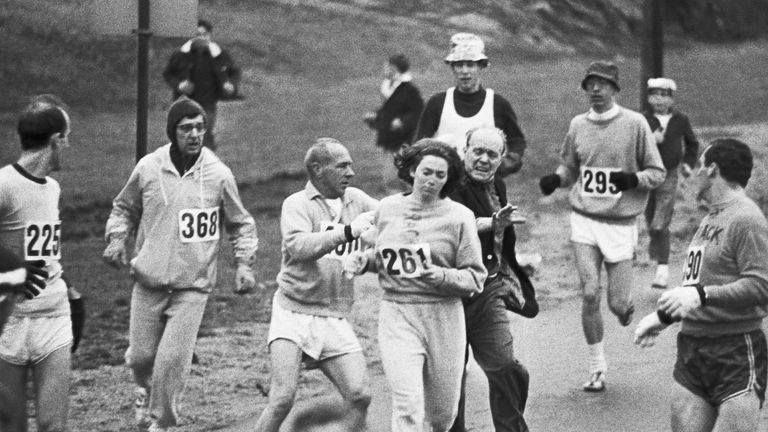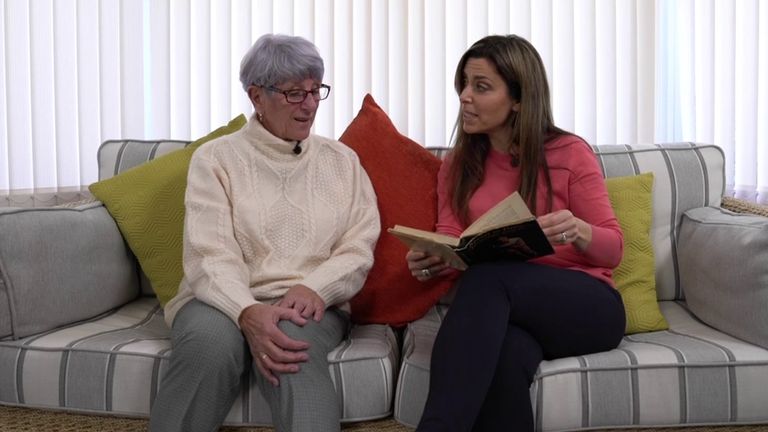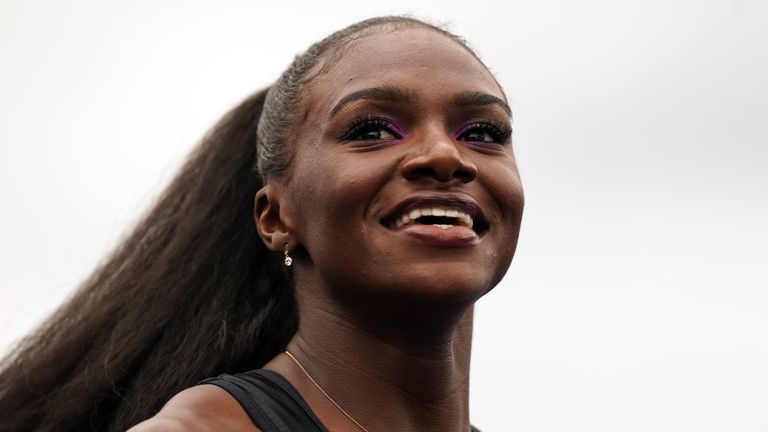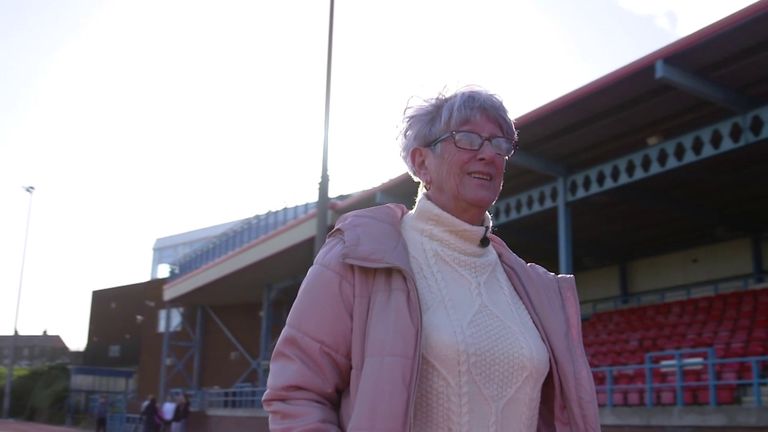International Women's Day: Dorothy Hyman on 1960 Olympics sprinting feat - a record yet to be matched
80-year-old Dorothy Hyman is the last British woman to win an Olympic medal in the 100m or 200m sprint; Hyman tells Gail Davis about her Olympic homecoming in Barnsley: “There couldn't have been any more (people) there if The Queen would have been coming through”
Tuesday 8 March 2022 20:50, UK
Dorothy Hyman was only 19 when she competed at her first Olympics in 1960. Her dream as a teenager was to win gold. Although she could not fulfil that ambition, her sprinting achievements 62 years ago have yet to be matched by a British woman.
Hyman is the last British female to win an Olympics individual sprint medal in the 100m or 200m.
In an exclusive interview, she shares her incredible story of breaking records around the world, running at a time of inequality for women in the 1960s, meeting The Queen, being worshipped in her hometown, and the feelings of not being allowed to compete in the peak years of her running career.
A coal miner's daughter from Barnsley
The biggest inspiration for Hyman was her father who was a coal miner. Without his encouragement and guidance, Hyman feels she would not have become a medal-winning sprinter. He spotted her talent at an early age.
"He came and watched me running in a school sports day," Hyman told Sky Sports News. "And I don't think I won that time because for some reason, before I got to the end, I turned round to look at somebody and they passed me! But he recognised that I could run and he set me off just practising, just running in the park anywhere. Because for some reason he knew to be better, you had to practice."
Hyman was a junior champion at every age group from 13 upwards. At the 1958 Commonwealth Games, she was part of a world record winning team that won gold in the 4×110 yard relay.
She was only 17 when those Games took place in Cardiff, and it was the first time she had been away without her father.
In that same year she also competed at the European Athletics Championships where she won a silver medal as part of the relay team. She would go to her first Olympics two years later as a teenager in form.
Olympics silver and bronze in 1960
The Rome Olympics in 1960 was the first to be televised live. Despite some impressive performances, Hyman was not expected to win the 100m.
At the age of 19, Hyman had already proved her talent on the world stage. She got to the 100m Olympic final and was initially leading the race.
"I was very nervous," she tells Sky's Gail Davis in her home in Cudworth, a small village in Barnsley.
"But I got off well and for the first ten metres, I thought I was in front! Until Wilma got in her stride. And obviously she was head and shoulders taller than I was."
Hyman finished second in the race which was watched by people around the world and by thousands of her supporters in Barnsley.
She said: "Well you think of home and you think 'oh I've done well'. In some ways you wish you'd have won. But you think of home, I wonder if they're watching. And people say: 'What was it like on the podium?' That's secondary. It's when you go through that tape. You know what you've done. That's the best part."
The US great Wilma Rudolph - who won three Olympic gold medals in Rome - won the race in 11 seconds. Rudolph was one of the famous Tigerbelles at Tennessee State University coached by the legendary Ed Temple.
Hyman was also on the podium in the 200m. She finished third to win bronze and came away with two sprint medals from her first Olympics.
Hyman's incredible Barnsley homecoming
Her success in international competitions saw her being welcomed back with several big homecomings. But it is the one in 1960 after her first Olympics which she still remembers fondly.
"There couldn't have been any more there if The Queen would have been coming through." Hyman reflected on the reception of the locals having returned from Rome.
She was driven through the town in a coach as locals handed her presents and flowers. The streets had been decorated with bunting as locals lined the streets. The coach stopped off at pubs so the people could congratulate their hero.
Hyman's first Amateur Athletic Association (AAA) title victories came in 1959 and she won the 100m and 200m double and she repeated her success in 1960, 1962 and 1963.
Perhaps Hyman's best year in her short running career was 1962. She won the sprint double at the Commonwealth Games and celebrated the two gold medals with another large homecoming.
In the same year she also celebrated being the fastest woman in Europe by winning gold in the 100m at the European Championships in Belgrade. It was one of three medals at the Championships as there was a silver in the 200m and bronze in the 4x100m relay.
Another Olympic medal and retirement
1963 was a special year for Hyman who also won the Sportswoman of the Year award, with Jim Clark winning the Sportsman award. They were pictured alongside British Prime Minister Alec Douglas-Home. Hyman also won the BBC's Sports Personality of the Year award in the same year.
Unfortunately injury hampered Hyman's chances in 1964 as she could not fulfil her dream of winning Olympic gold.
Although she was not fully fit, she still won a medal. She ran alongside Janet Simpson, Mary Rand and Daphne Arden to win bronze in the 4x100m relay.
At the age of 23 Hyman felt she could have dominated the sport for the next few years but explained why she decided to retire.
"At that time I was tired because I worked full-time and I trained," she said. "So it was all work, bed, work, bed. And I thought life was passing me by."
It was a decision she did not regret but has always made her wonder how much more success she could have had.
A £150 book … and banned from the Olympics
Hyman got £150 for writing an autobiography in 1965 but that meant her elite sprinting career was over. She was not allowed to return to international competitions as the book meant she was not regarded as an amateur anymore.
She felt she was running faster in her late 20s than she did at her first two Olympics, but there was no chance of a comeback because of her decision to write the book and accept money. Hyman was allowed to run in domestic races and won another AAA title in 1969 - her ninth in total.
Hyman was working in the offices of the National Coal Board where she spent 30 years. She was the first female tracer to work at the Coal Board and worked in the planning office at Woolley Colliery in Barnsley.
She turned to coaching and set up the Dorothy Hyman Track Club based at the stadium in the home town of Cudworth. She worked with the next generations of British sprinting. Later in her life she worked with people with learning disabilities.
Looking back, would Hyman want to be an athlete in the modern era?
"I don't think so," she says. "People say 'Dorothy you would have been a millionaire'. And obviously we all like to have nice things and you think of the things it would have let you do.
But no, I think my way was a better way. I had my athletics. I had my work and I had an outlet. I had a different way of life.
With modern technology and tracks perhaps being quicker to run on, does she wonder how fast she would run today?
"I do wonder now," she says.
"Not until I've got older. And I thought, 'Oh, well, if I'd have run again I wonder how fast I could have gone'."
A trip to Buckingham Palace in 1965
Hyman remembers being "overawed" when she went to Buckingham Palace in 1965 after being awarded an MBE. She tells Sky Sports News about the nerves on her special day.
"Looking around, seeing all the things, being frightened to death that you would do wrong thing because you're told, 'you don't turn your back on The Queen, you've got to reverse back and turn, and walk off and somebody will give you your box at the other end'.
"So I was petrified that I would do the wrong thing. And after she'd spoke to me I thought I'd turn but I didn't! I can't remember what she said to me. I think she asked me what I was doing now because obviously I had retired by this time. But she said quite a longish conversation."
Hyman's legacy continues as a short distance from her home there is a large sports facility named after her called the Dorothy Hyman Sports Centre which includes a 400m running track. Many years ago she remembers meeting Jessica Ennis-Hill at the venue in Cudworth before she won heptathlon gold in 2012.
Hyman says: "When she was first starting out at the track that takes my name, I had my photograph taken with her because she was an up-and-coming young athlete, and I doubt if she'll remember. But that made me follow her. [I was] so sad when she had her injuries, but so pleased when she battled on and got what she strived for."
As part of her interview, Hyman agreed to meet some local youngsters on that same track to answer questions and offer advice. She advised them to never give up on their dreams and to try running at different distances at a young age to find their strengths.
Martin Prest, Facility Manager at Dorothy Hyman Sports Centre, said it was a "lovely and inspiring" afternoon. He added: "Everyone really enjoyed it and the youngsters loved meeting Dorothy."
As a sign of Hyman's popularity, Prest says the Sports Centre still receives letters and fan mail for Hyman and he regularly drops off letters at her home. The last one came from Europe.
Dorothy gets her 1963 trophy in 2018
Hyman beat F1 world champion Jim Clark to win the BBC Sports Personality of the Year in 1963. But she never got to keep a replica of the trophy until a successful campaign a few years ago.
Hyman's local MP Stephanie Peacock, whose constituency is Barnsley East, was the inspiration to Hyman finally getting a trophy four years ago. The Labour MP says the 80-year-old from Cudworth is still seen as an inspiration.
In a statement to Sky Sports News, Peacock said: "Dorothy is an inspiration and a legend here in Barnsley - and in British sporting history.
"Born in Cudworth and now living in Stairfoot, in Barnsley East, she did our town proud through her incredible sporting achievements and winning the BBC Sports Personality of the Year award in 1963.
"But, in 2018, we learnt that she was only person to have won the Sports Personality of the Year not to receive a replica of the trophy after their win.
"I was proud to lead the campaign to get her well-deserved trophy to her, raising the issue in Parliament and with the BBC, and to finally see her presented with her replica 55 years after her win.
"She continues to be a local hero and the Dorothy Hyman Sports Centre, in Cudworth, stands in honour of her incredible achievements."
Barnsley Mayor Cllr Caroline Makinson told Sky Sports News Hyman is still celebrated in Barnsley over six decades after her success.
"Dorothy's impact on Barnsley has been phenomenal. She's been a shining light for what women in Barnsley can achieve," she said.
"She lit up the nation in the early sixties, when at such a young age she delivered Olympic medals as well as Gold and Silver medals from the Commonwealth Games and European Championships.
"She is very well thought of in Barnsley, and in 2019, when the Women's Tour de Yorkshire started right outside our town hall, we were proud to have invited Dorothy to do the ceremonial ribbon cutting to start the race on a stage where women's racing matched that of the men's.
"Dorothy is still very highly regarded with a sports centre named after her in Cudworth, and a blue plaque was unveiled at the centre in September 2021, to celebrate her fantastic athletic achievements.
"This allows those of a younger generation to recognise her achievements and look up to her as a role model. The sports centre sees many young people attending it every year, which benefits their health and wellbeing."
Interviewing Dorothy Hyman…
Sky Sports News reporter Gail Davis shares her reflections after spending the day with Dorothy Hyman…
I met Dorothy at her house in Cudworth just after noon, she'd been doing her sister's shopping that morning. They live close, Dorothy has never felt the need to move away from the area she grew up in.
She rarely reflects on her achievements of six decades ago that despite the huge cabinet packed full of Olympic, European and Commonwealth medals hung in her hallway.
It was made by someone locally and at the bottom is a little plaque that read: "To Dorothy a girl that fame never altered." Eight words that perfectly sums up the last British woman to win an Olympic individual medal in the 100 or 200 metres. 62 years and counting.
Dorothy didn't even have a copy of the book she wrote "Sprint to Fame" until someone recently bought it off an auction site. Her copy had been borrowed and never returned.
The idea she was a trailblazer doesn't sit easily but at a time when athletics was dominated by men it was almost unthinkable that a coal miner's daughter from Barnsley trained by her Dad could become a global sprinting superstar.
As the first female tracer working for the Coal Board maybe it came naturally. She loved her job and worked there for 30 years, it's one of the reasons she doesn't think she'd enjoy being an athlete in the modern era. She liked to compartmentalise and did not want to be defined by one thing.
She never regretted her decision to retire at 23 after an injury denied her a potential Olympic gold medal in Tokyo. She has no bitterness that despite running faster times a few years later she was never allowed to compete at the Olympics having written her book that earned her £150 so she was deemed a professional.
Occasionally and only recently she wonders just how fast she might have been able to run in the modern era given the modern techniques and equipment but the idea of the stress and pressure of the modern athlete, the issues of mental health and drugs leaves her thinking that financial rewards come at a big cost.
It's at the local stadium and athletics track that bears her name where Dorothy really comes alive, surrounded by sprinters hoping to emulate her achievements. She knows many of their grandparents and great aunts, coached their uncles and cousins and they are all excited to meet her. It doesn't matter that there is almost a 70-year age gap. The kids hang on her every word.
When you listen to her answering their questions you realise a lot has changed. Including the track which was a cinder one, the warm-up routine of athletes, her spikes that were sharp and heavy, and her kit so awful she says of her oversized tracksuit that she has never worn one since.
But a lot has also stayed the same. Like the need to work hard, harder than the person next to you and the necessity to park the disappointments and to make it fuel you.
Dorothy makes a quick stop to see the manager of the sports centre before she leaves. There's some fan mail to collect and autographs to sign, then it's off back home and that's exactly the way she likes it.
